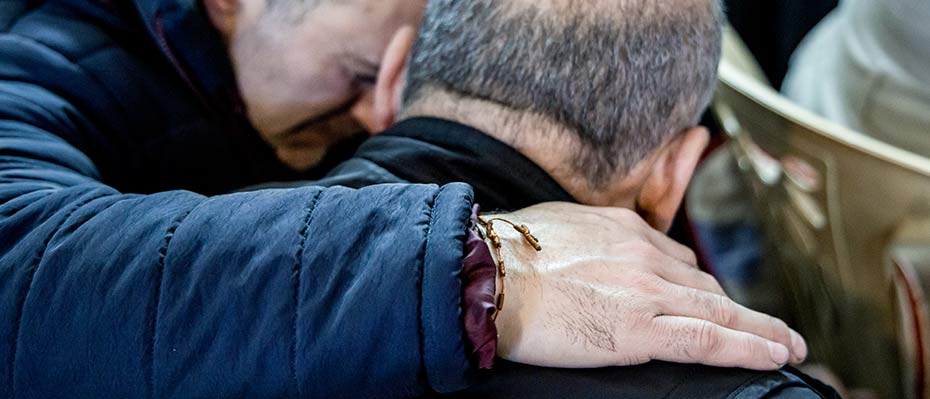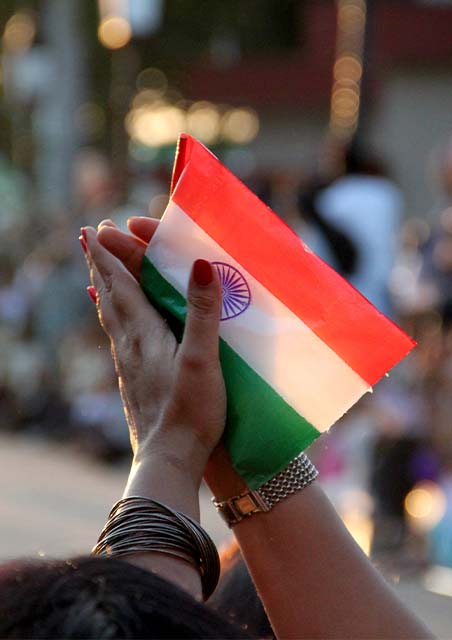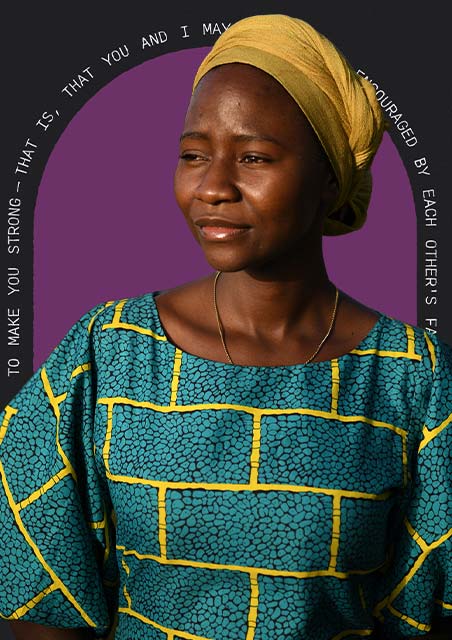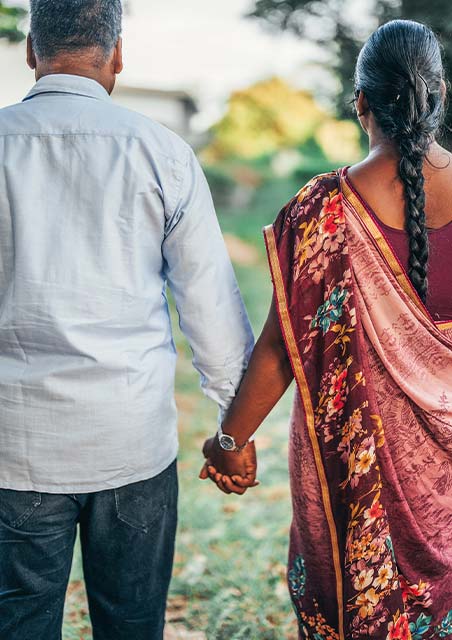Update: Priest in Belarus removed from post after speaking out against war in Ukraine
Fr Nozdrin from Belarus has been removed from his parish by his bishop after continuing to speak out against Russia’s continued invasion of Ukraine and Belarus’ role in it. Please pray for strength, wisdom and comfort for Fr Nozdrin.

Fr Nozdrin says that ‘a Christian cannot say that what's going on in Ukraine is good'
When Fr Andrei Nozdrin, an Orthodox priest from Belarus, publicly opposed Russia’s renewed invasion of Ukraine and his country’s role in it, the police came knocking with a warning.
In April, local police summoned Fr Nozdrin for a ‘preventive conversation’ after complaints from two informers who were not happy with his anti-war position and singing the hymn, “Mighty God”. The hymn is associated with opposition to the regime, which is monitoring, threatening and punishing religious leaders and people opposing Russia and Belarus’ role in the ongoing invasion of Ukraine. Both the regime and the head of the Belarusian Orthodox Church, Metropolitan Veniamin, have banned the singing of the hymn.
“They questioned me about my statements regarding Ukraine and why we sing Mighty God in the church,” Fr Nozdrin told Forum 18. “They even talked to my neighbours and friends but found no criminal wrongdoing.”
On 25 April, Grodno's October District Police wrote to Fr Nozdrin, warning him against alleged ‘extremist violations and crimes’. Fr Nozdrin pointed out that everyone knew that in his sermons and elsewhere, he always insisted that ‘a Christian cannot say that what's going on in Ukraine is good and should understand that killing is a sin’. He maintains that he will continue to teach these ‘Christian principles’.
Removed from his parish by the bishop
On 18 May, Archbishop Antony Doronin of Grodno dismissed Fr Nozdrin from all his diocesan roles, and transferred him away from Grodno to a small village. Fr Nozdrin regrets leaving the Grodno parish where together with the parishioners he built a church and the largest Sunday school for children in the city. He told Forum 18 that the parishioners were upset about his transfer.
The regime sent a police unit to attend Fr Nozdrin’s 20 May farewell service, ‘but the people showed them out because they did not pray,’ Fr Nozdrin said.
The spokesperson for Grodno Diocese, Fr Igor Danilchik, insisted that Fr Nozdrin's transfer was Archbishop Antony’s decision alone, and claimed that the transfer was not done under pressure from the regime. He did not explain why the regime sent police to Fr Nozdrin’s farewell service. Fr Danilchik also claimed that Grodno parishioners had not complained to the Diocese.
Fr Nozdrin is not the only one facing backlash for his comments; the regime has similarly targeted other Orthodox and Catholic priests.
Source: Forum 18
Please pray:
- For continued boldness for Fr Nozdrin, that he and others will continue to speak out against the war in Ukraine
- That the church in Belarus will not bow to pressure from the government, and will become more united
- That Fr Nozdrin’s outspokenness will create change and give others the courage to take a stand.
--
31 March 2022
“We are against this violence with all our hearts” – an interview with a believer in Russia
As the violence in Ukraine continues, Open Doors partners met with Olya*, a Christian from Russia. In her own words, she shared with them what life is like for believers there, and how her church is responding to the unfolding crisis.
As a Christian, how do you feel the war between Russia and Ukraine?
Initially, my family and I couldn’t believe this was the truth, it looked so crazy and impossible. We are against the war; we pray that God will intervene and stop the violence. It was so hard to accept that our country started the war, that we ‘broke somebody’s home’.
It was also hard to accept that this would have very hard consequences for the whole world. The first week was so hard for me; I was crying every day because of what I was learning from the media and social networks about the situation: violence, suffering Ukrainian people, refugees, death. I also heard about Christian believers and churches suffering from the war. It made me cry and suffer and pray constantly; I couldn’t find peace.
How did you and your church react?
In our church, we organised prayers, even 24-hour prayer chains for the situation. Groups of church members prayed day and night, and many were fasting. We can’t stop the war, we can’t even speak out to be heard, we can’t organise a revolt against our president and the government. As Christians, we have to bless, even though we are so much against what they do. We believe there could be another way, a diplomatic way to come to an agreement.
Our church also collected some funds for Ukrainian believers and sent them through one of our church members who had relatives on that side. The funds went to a church where there are lots of disabled people, and they were so grateful for this. They also purchased groceries for church members. Now we plan to collect more, but right now we don’t know how to transfer the funds as the border is closed. We pray for the opportunity to transfer.
"Propaganda means that there is no chance to learn the truth about what is happening"Olya
What kind of problems are you facing now?
It is very hard for us – Russian believers – to feel the hatred from all over the world. It makes us feel guilty, even though we are not; we didn’t ask for this war, we don’t support it, we are against this violence with all our hearts.
My close relatives are a Christian family who have young sons. They are so stressed because their sons might be recruited into the army in the next few months and sent to war. They fear for their sons’ lives and, of course, they do not want their sons to fight against our brothers, killing people in their homes in this senseless struggle.
What are you personally struggling with at the moment?
The first week was the hardest. So many issues – lots of news and all of them seemed to be lying; propaganda means that there is no chance to learn the truth about what is happening. The growing violence, death and hatred made me so sad; I cried.
Then we also face problems because of sanctions, economic issues, which are not easy to deal with in everyday life. We can see that sanctions do not harm those who organised the war – politicians; they punish ordinary civilians.
One of the hardest things for me was worrying about my family, about my relatives who can be recruited into the army and sent to war. I couldn’t stand this madness and I dived into prayer and the Scriptures, by myself and together with my family – my husband and three children. God is faithful; He gave us peace. Now I am sure that I am not guilty in what happens. God keeps everything under His control, even though we cannot understand why this happens. God warned us about such situations in Matthew 24:6: “You will hear of wars and rumours of wars, but see to it that you are not alarmed. Such things must happen, but the end is still to come.”
"I want to express my gratitude to everybody who is praying for this situation... Prayers are so needed now, keep going, please!"Olya
I know God protects me and my family and He always will do; He provides for all our needs. God taught us through this terrible situation that we should not be sad because of the hatred everywhere; we can love, He gave us the example.
We are still struggling sadness and worry because of the events every day. But now we don’t feel as lost and frustrated.
How would you like people pray for you, your family and other believers in your country?
First of all, I want to express my gratitude to everybody who is praying for this situation, for Ukrainian citizens and the church, for our country – thank you very much! Prayers are so needed now, keep going, please!
Please pray:
- That God would intervene in the situation and stop the violence
- For God’s wisdom for the presidents and authorities of both our countries for how to deal with the situation in peaceful way
- That God will care for those who are in danger, especially for Ukrainian people who lost their beloved ones, for His comfort and protection over them and the Ukrainian church
- For opportunities for our churches to support Ukrainian believers in need
Please also pray for Russia:
- That God will comfort Russian families who have lost their beloved ones
- For Russian men not to be sent to this senseless war
Please pray for me and my family too, to feel peace, and for God’s protection. Pray that God will turn this terrible situation to the better, even though this looks impossible now, to turn the hatred into love. He is almighty and He can do much more than we can imagine, He can change this. Please support us and our Ukrainian brothers and sisters in prayer.
*Name changed for security reasons
--
18 March 2022
Could religious freedoms be lost in Ukraine?
As Russia continues its invasion of Ukraine, Open Doors joins with others across the world in being shocked and saddened by the news, images and videos emerging from the country highlighting the awful suffering facing millions of innocent people. You can find here prayer points, together with updates and observations from commentators and local pastors.
Alan Hall remembers the first time he met the Christians of Kiev, Ukraine.
“I worked with the Baptist Church in Ukraine. We worked to get them the materials they needed to help them with their Christian witness.”
This was risky work back then, in the 1980s, when Alan was president for international development at Open Doors. It was a time when Ukraine was subsumed into the sprawling communist Soviet Union.
Smuggling Bibles into Ukraine
For over 60 years, Open Doors has been providing support for Christians around the world facing persecution for their faith, and life for practising Christians in Ukraine was tough.
Any form of Christian witness was strictly forbidden, under the rule of the atheist Soviet Union. However, as Alan remembers, this didn’t dampen the spirits of Christians.
“Often in the UK, we can be very passive and reactive about our faith,” he says. “The church in places like Kiev wasn’t reactionary, Christians were living their faith, they were working it out proactively.”
The most sought-after resource in all the nations of the Soviet empire were Bibles, and Open Doors, in the footsteps of its founder Brother Andrew had been smuggling them into Ukraine by the thousand.
There has been no need to do that for Ukrainian Christians for over three decades now. Ukraine left the USSR in 1990. And whereas some post-Soviet nations have slidden into totalitarianism, religious freedom has remained untouched there. Most of the country still identifies as Christian, and nearly two thirds belong to branches of the Orthodox Church.
The Russian invasion and religious freedom
In the last few days, as Russian tanks advance on the major cities, citizens have taken to the streets to fight, afraid they might lose vital freedoms such as democracy. What about religious freedoms, though? Could Ukraine return to the bad old days of underground churches and smuggled Bibles?
Russia itself has tightened up its legislation against some forms of missionary activity, with the controversial Yarovaya law (or ‘anti-missionary’ law), which was passed in 2016. It sees the government imposing legal restrictions and controls over churches, with church leaders sometimes facing interrogation.
However, according to Rolf Zeegers, who works as a Persecution Analyst for Open Doors, even if the Russian invasion is successful, Ukraine’s churches are unlikely to see a return to Soviet days.
“I don’t think Russia is seeking to annexe Ukraine, so we don't need to expect the implementation of Russia’s anti-missionary legislation in Ukraine. However, there would be restrictions.
“Churches could be prevented from getting funds from abroad, having visiting pastors from abroad, who would otherwise provide training as well as imported Christian literature. Even so, I do not expect a wave of arrests and detentions.”
However, he agrees that the two ‘rebel’ regions, Donetsk and Luhansk, whose new leaders have looked to Moscow for support, have seen the churches stripped of some of their freedoms, since 2014.
“It’s a different situation in the two rebel regions, where the rebels have been developing their own policies regarding religion. Officials have confiscated Christian literature and churches have been prevented from meeting when the regional authorities have denied them the necessary registration.”
Putin and the Russian Orthodox Church
One key difference between today and the days of Soviet occupation, is that President Vladimir Putin’s Russia is no atheist state. Indeed, in order to affirm his nationalism, Putin has been getting closer to the ancient Russian Orthodox Church in recent years. The Church’s leaders have often frowned upon the presence of other denominations, including Baptists and even Roman Catholics, in a region they have considered rightfully theirs.
There are similar feelings of toes being stepped upon in Ukraine, where the Russian Orthodox Church has been present – as it has in Russia – for over a thousand years. However, it has a rival. The Ukrainian Orthodox Church has been present there for nearly 500 years. And in 2018 it was officially acknowledged by the Ecumenical Patriarchate of Constantinople as a legitimate Orthodox Church in its own right, finally cutting ties with the Moscow Patriarchate.
Relations between the two wings of Orthodox Christianity have not been especially cordial, as Alan remembers from the days of communism.
“I can tell you that in my dealings with the Russian Orthodox Church in those years, there was no love lost between the Russian Orthodox Church and the Ukrainian Orthodox Church,” he says. “They were poles apart.”
"We urgently need to pray that Ukraine’s believers will listen for the voice of the Lord" Rolf Zeegers
This could spell trouble according to Rolf. “What may happen if Ukraine steps into the fold of Russia again, is that the Ukrainian Orthodox Church may be under pressure to unite again with Moscow,” he says. “And if they don't want that, then we will have problems.”
However, he doesn’t think the Russian Orthodox Church hold the same sway in Russia now as it did in Tsarist days: “Don't forget that 70 years of atheist Communism blotted out quite a lot of the old influences that the Russian Orthodox Church had on state bodies. And Putin has never recognised them as the official state church.”
Churches unite to condemn invasion
Ironically, the current planned invasion appears to be bringing both wings of Orthodoxy – and the whole Christian Church in Ukraine – closer together.
“I've seen statements from the Ukrainian and the Russian Orthodox Churches in Ukraine condemning the invasion. I've seen the Greek Orthodox Church and the Roman Catholic Church in Ukraine saying the same thing. The Baptists have been asking for prayer. They are all of one mind on this – none of the Christian communities are backing Moscow.”
One thing there is not official agreement on is how Ukraine’s Christians should respond to the invasion. As ordinary citizens are picking up guns and Molotov cocktails, what role should they play?
“We urgently need to pray that Ukraine’s believers will listen for the voice of the Lord, for guidance and wisdom in this situation – so that they will be able to stand strong and spread the gospel despite, everything that is going on around them.”
Alan is convinced that, while the church there may have been free of Soviet persecution since 1990, its passionate commitment to the Gospel has not been erased by relative ease of subsequent decades.
He says: “I think the spirit of people there means that they will still stand by the faith and whether they're old or young the church will stand. The church will grow and the church will continue to live out its Christian convictions.
“I think we should pray that they will be resolute, be wise, be warned and be ready to serve the Lord.”
--
14 March 2022
Five ways to pray for Ukraine and Russia
1. Peace
Please pray for an end to the violence and tension, and that leaders on all sides will pursue diplomacy and peace in a way that allows people of all faiths to live in freedom and peace.
2. Protection and provision
Ask the Lord to guard people from harm – both those in Ukraine and those travelling to places of refuge – and provide for all their needs. Pray for a greater respect of human rights.
3. Politicians
Ask that God would open the hearts of leaders in Russia and in areas of Ukraine under Russian control, that they would not restrict the ability of believers to worship God freely.
4. Persecuted believers
Pray that believers facing pressure for their faith in Russia and Russian-controlled areas of Ukraine will be encouraged and strengthened in their faith, and guarded from harm (see below for more information).
5. Powerful witness
Ask the Lord to use His church in Ukraine and Russia in powerful ways during this crisis. Pray that Christians in both countries will be bold, united and strengthened in their witness.
Are Christians persecuted in Ukraine and Russia?
Ukraine achieved independence from the USSR in 1991 and there is religious freedom in most of the country. However, in Russia and Russian-controlled areas of Ukraine, religious freedom is increasingly in decline.
Russia has appeared in the top 50 of Open Doors’ World Watch List in the past, as recently as 2020. In the current list, the country lies just outside the top 50. The persecution largely stems from localised pressure and violence against believers in Muslim-majority regions, such as Dagestan and Chechnya.
Since 2016, following the introduction of the Yaravoya law (also known as the ‘anti-missionary law’), opposition against Christians actively sharing their faith has intensified. This applies not only to Russia but to regions in Ukraine under Russian influence and control, such as Crimea.
The U.S. Committee on International Religious Freedom (USCIRF) found that, ‘in Russian-occupied Crimea, the occupation authorities continued to enforce Russia’s repressive laws and policies on religion, which has resulted in the prosecution of peaceful religious activity and bans on groups that were legal in Crimea under Ukrainian law’. In fact, USCIRF even recommended that Russia be placed on the State Department’s list of “Countries of Particular Concern”.
Russia’s support of breakaway regions is also troubling for Christians in Ukraine. Luhansk and Donetsk – two regions that have declared independence – have imposed rules requiring religious organisations to register. Complying with the rule has been difficult for many Protestant churches – for example, a December 2019 list of 195 registered religious organisations by the Luhansk authorities showed that no permission had been granted to any Protestant community.
In June last year, three Protestant churches were banned by authorities in Donetsk and others had their buildings confiscated. In August, books by Charles Spurgeon and Billy Graham were placed on a list of banned ‘extremist’ literature by a court in Luhansk.
Consequently, as far as Ukraine is concerned, while most believers can freely express and share their faith, there are some areas where Christians are feeling the pinch of persecution.
How is the church responding to the crisis? Despite pressure and persecution, and the wider crisis facing Ukraine, believers are united and determined. “Those [churches] that are in the western part of Ukraine… told our brothers and sisters in other parts of Ukraine that if something happens, we will open our homes and our churches to you,” explains Yarsolav ‘Slavik’ Pyzh, president of the Ukrainian Baptist Theological Seminary.
Looking ahead, Yarsolav adds, “I think that we will rearrange, reorganise, and still do what we always do: still preach the gospel.”
Does Open Doors work in Ukraine?
Open Doors does not currently work in Ukraine, as there is religious freedom in most of the country. However, we are gravely concerned for the wellbeing and safety of all involved in the invasion of Ukraine and are closely monitoring the situation on the ground. We will continue to share the latest news and prayer requests as we receive them, to help the church here to pray for the country and for the Christians there.
“And pray in the Spirit on all occasions with all kinds of prayers and requests. With this in mind, be alert and always keep on praying for all the Lord’s people. Pray also for me, that whenever I speak, words may be given me so that I will fearlessly make known the mystery of the gospel, for which I am an ambassador in chains. Pray that I may declare it fearlessly, as I should.” (Ephesians 6:18-20)
--
10 March 2022
Pastors in Ukraine share how believers there are keeping the faith
Two pastors in Ukraine, Victor Punin and Keith Daniel, share how the church is continuing to be salt and light during the horror and tumult of the ongoing Russian invasion. Please continue to pray with them for protection and for an end to the war.
Pastor Victor Punin is seeing God’s hand at work in Kyiv, where he is based.
Speaking to an Open Doors contact, he says, “At this moment we see a lot of bombs that do not explode. We have a lot of testimonies of people being led out of danger, shortly before an attack. Also, very heartening, many people in the Ukrainian army are asking for prayer.”
Despite the brutal conflict raging in his country, Victor and his congregation are praying with a clear expectation that their prayers will be answered.
“Today we, we prayed at 12 noon with all denominations,” says Victor. “It was announced the whole of Ukraine would pray together, although it’s hard to meet in person.”
“Churches are now active in missions”
As his friend Pastor Keith Daniel puts it: “The Ukrainian church is a praying church”. It is clear, listening to their stories, that this is also a serving church, a mission-focused church and more. And it is a church that, crucially, has been matured and refined over several years.
Pastor Keith remembers the first time he went to Ukraine, as a missionary in 1999 – a few years after the fall of the Iron Curtain. It was an exciting time, he says.
“In the nineties, there was church planting all over the place. It was almost a revival. There was a lot of foreign input and a lot of good was done. With all these new church plants, a lot of young pastors were still learning the ropes.”
However, Keith, based in the central Ukrainian city of Kryvyi Rih, does not look back on the turn of the millennium as a golden age for the church in Ukraine. When he returned in 2010 to lead the discipleship organisation Kingfisher Mobilising Centre there, he was amazed by the transformation churches had undergone.
“I found the Ukrainian church had matured in so many ways,” he says. “Churches are now active in missions.”
“All denominational differences have collapsed”
It is a maturity that has stood Ukraine’s churches in good stead as the darkness of conflict descends on their country once again. And it sees many churches across Ukraine ready to play a critical humanitarian and spiritual role during the current crisis.
“Our people have travelled across the country to help,” says Victor. “They do different things: in Kyiv they are helping people in bomb shelters and people who are alone in apartments – encouraging them and bringing food, all kind of needs. Many are helping refugees to get across the border.”
It’s easy to miss the significance of the words: ‘all denominations’ that Victor uses when he talks about their prayer meetings. When the Iron Curtain first came down in 1990 and new churches started being planted, there was a distinct lack of unity in many parts of the Christian church.
“The charismatic evangelicals were mostly seen by the Orthodox as like a cult and thought of as weird people,” remembers Keith. There was also mistrust between established Pentecostals and newly planted charismatic churches. However, all that has changed. And it was another crisis that precipitated the biggest shift in attitudes.
“Evangelicals were always slightly in the shadow of the Orthodox Churches,” he says. “But since the war started in the Donbas region in 2014, they have come to the fore, because they're so active helping in the community. And people started to say, ‘Wow, these guys really are true Christians!’ The Lord is breaking these denominational barriers down, and it’s a beautiful thing.
“There is a respect now for each other. In our city they've been having regular meetings, eating together, and praying together. We have started to see each other’s hearts.”
“Right now, all denominational differences have collapsed,” agrees Victor. “Every Christian is praying with the same attitude.”
"We focus on serving and encouraging one another”
The coordinated acts of prayer and service are more impressive when you consider how hard it is for churches to keep functioning in the current chaotic circumstances.
“We cannot conduct any Sunday meetings and we can’t afford to pay our staff,” says Victor. “So, the whole church administration has collapsed. And many of our congregation have chosen to flee Kyiv or even Ukraine. The church, as an administration, is not working now, but as a relational body, we still are.
“Every morning we contact every single person in the church, asking where they are, are they safe, is everything okay? We focus on serving one another and encouraging one another. So right now, 11 people are staying in our house, just for shelter.”
While many civilians are arming themselves, Victor shares that most Christians he knows are avoiding any violent confrontation.
“I would say most Christians would not like to pick up a weapon or kill others. They would rather leave Ukraine altogether.”
How is his congregation feeling?
“That’s another miracle from my side; there’s a peace and calmness of people I am in contact with. I've seen so much stability in the church people and so much willingness, just to do something. Of course, you will always have those people who would rather save their lives first. But I have been surprised how many people have been ready to really sacrifice something for others.”
For Keith, the church in Ukraine has undergone a beautiful metamorphosis from when he first set foot in the country just before the turn of the millennium.
“It's a really mature church. They are self-supporting and self-propagating. I think the Ukraine church could teach churches in the West a lot of things.”
Open Doors does not currently work in Ukraine as there is religious freedom in most of the country. However, we are gravely concerned for the wellbeing and safety of all involved in the invasion of Ukraine and are closely monitoring the situation on the ground. We will continue to share the latest news and prayer requests as we receive them, to help the church here to pray for the country and for the Christians there.
--
2 March 2022
Ten Christians fined for their faith in Crimea last year
At least 10 Protestant Christians in Crimea – a region in south east Ukraine that is under Russia's control – received fines for exercising their faith in 2021, according to the news service Forum18.
In 2021, 23 administrative prosecutions under the Yarovaya law – also known as an ‘anti-missionary law’ – were documented. These laws were imposed by Russia after it occupied Crimea in 2014.
Four cases involved members of the House of the Potter Protestant Church in Sevastopol, a city on the Black Sea coast. The pastor, Evgenii Kornev, and a church member were fined for leading church services and another church member was fined twice for actively participating in the services. Charges were partly based on evidence gathered from the church’s social media channels.
Christians charged for singing at a bus stop
It's not the first time the church clashed with authorities. Over the years, some of its members and the pastor have been charged under the law that criminalises ‘Russians conducting missionary activity’ for speaking with people, distributing leaflets and singing at a bus stop.
And they’re not the only church coming under increasing pressure. In February 2022, Russia’s security service raided a small Protestant church in Kerch, a town in eastern Crimea, allegedly to make sure the community was operating in compliance with Russia's Religion Law. In the end, one church member was accused of, and fined for, handing out leaflets to two women who were not members of the church.
How does the situation in Crimea compare to other regions in Ukraine?
The situation in Crimea is different from what is happening in the eastern Donbas region and the rest of Ukraine, says Rolf Zeegers, an Open Doors’ World Watch Research analyst.
Protestant churches in Donbas have been under increasing pressure since 2014 after rebels, backed by Russia, established self-proclaimed independent republics in the Donetsk and Luhansk provinces.
“While Russia affirmed the independence of both the Luhansk and Donetsk People's Republics, it has not yet annexed them and therefore the Russia's Religion Law, including the anti-missionary laws, do not apply here,” Zeegers explains.
“That said, authorities in these republics can make their own religion laws and reports from last year show that they sometimes go further in their actions against certain denominations than Russia itself.
Human rights and religious freedom violations remain of concern, Zeegers says. “The current regime is nationalist and wants Russia to return as a world power… The USSR was a totalitarian state and Russia has increasingly moved in that direction over the past years. No independent thinkers are allowed – think of the case of opposition leader Alexei Navalny – and, as in the old USSR, the levels of surveillance and monitoring are high.”
Open Doors does not currently work in Ukraine as there is religious freedom in most of the country. However, we are gravely concerned for the wellbeing and safety of all involved in the invasion of Ukraine and are closely monitoring the situation on the ground. We will continue to share the latest news and prayer requests as we receive them, to help the church here to pray for the country and for the Christians there.
--
25 February 2022
Church in Ukraine calls for prayer as Russia launches invasion
Russia has begun its invasion of Ukraine, and churches in the western part of the country are preparing themselves, according to the president of the Ukrainian Baptist Theological Seminary, Yarsolav “Slavik” Pyzh. “Churches already agreed,” he says. “Those that are in the western part of Ukraine… told our brothers and sisters in other parts of Ukraine [that] if something happens, we will open our homes and our churches to you.”
Church has not forgotten persecution under Soviet Union
Persecution is not new to the church in Ukraine. Pyzh shares, “You have to understand that historically we had that experience before under the Soviet Union. So the church did not forget what it means to be persecuted, and I think that we will rearrange, reorganise, and still do what we always do: still preach the gospel.”
Open Doors ‘calls on all parties to actively protect religious freedom, which includes recognising and protecting the right of all Christians – Orthodox and non-Orthodox – to gather and worship freely, in private or in public, en masse or individually,’ a spokesperson said. “We urge authorities in all regions to provide legal recognition of churches regardless of their registration status or size of their congregation, allowing them to function peacefully with equal access to all resources.”
Church under pressure in eastern Ukraine
Churches in Ukraine’s eastern Donbas region have been under increasing pressure since 2014 after anti-government protests led to a Russia-backed uprising in the Donetsk and Luhansk provinces, where rebels established self-proclaimed independent republics.
Authorities in both self-declared republics have imposed rules, requiring religious organisations to register. Complying with the rule turned out to be extremely difficult for churches other than those aligned with the Moscow Patriarchate Orthodox Church. A December 2019 list of 195 registered religious organisations by the Luhansk authorities showed that no permission had been granted to any Protestant community.
In November, the European Evangelical Alliance declared Donbas to be the area in Europe ‘where the church suffers most’ because of conflict and religious freedom violations.
“As in the old days of the Soviet Union, the obligation to register with the authorities is being used to make certain Christian activities illegal. No registration means no access to gas, electricity or water – hence making church activities virtually impossible,” said Rolf Zeegers, persecution analyst with Open Doors’ World Watch Research.
As the so-called Donetsk and Luhansk People’s Republics are not officially recognised by the international community other than by Russia, they are not bound by international human rights law.
Please pray for our church family in Ukraine.
Open Doors does not currently work in Ukraine as there is religious freedom in most of the country. However, we are gravely concerned for the wellbeing and safety of all involved in the invasion of Ukraine and are closely monitoring the situation on the ground. We will continue to share the latest news and prayer requests as we receive them, to help the church here to pray for the country and for the Christians there.




